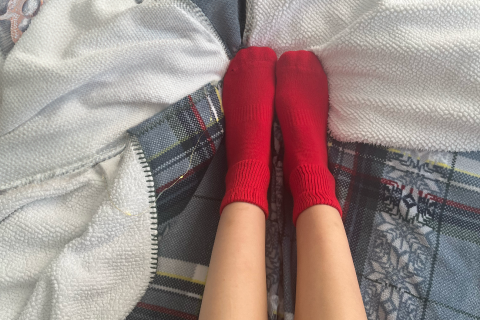As we dive into the nuances of how socks affect sleep, it’s important to understand the relationship between body temperature regulation and sleep quality. Wearing socks to bed can influence your sleep patterns by creating a thermal regulation that aids in faster sleep onset and deeper sleep cycles.
The Connection Between Feet Temperature and Sleep Efficiency
Research suggests that warming the feet, whether through a warm bath before bedtime or by wearing socks, can help the blood vessels to dilate, a process known as vasodilation. This dilation of blood vessels in the feet sends a signal to the brain that it's time to sleep, facilitating a quicker transition to sleep and maintaining a better sleep cycle throughout the night.

How Socks Promote Sleep
-
Enhancing Circulation: Socks help to enhance blood flow, which can be particularly beneficial for those with poor circulation, potentially easing symptoms of Raynaud's disease or peripheral neuropathy, which can disrupt sleep.
-
Moisture Control: High-quality socks, especially those made from moisture-wicking materials, can keep your feet dry throughout the night. This is crucial for preventing fungal infections and maintaining skin health, which can impact sleep comfort and quality.
-
Temperature Regulation: Maintaining a balanced body temperature during sleep is essential for uninterrupted sleep. Socks contribute to this by insulating the feet and regulating body temperature, which in turn helps to minimize night-time awakenings and improve overall sleep efficiency.
Optimal Sock Choices for Better Sleep
When choosing socks for sleep, consider materials that balance warmth and breathability such as merino wool or bamboo fibers. These materials not only keep your feet warm but also promote air circulation, reducing the risk of overheating.
Psychological Comfort and Sleep
Emotional Security: For many, wearing socks to bed provides a sense of security and comfort, which can be particularly soothing, thus promoting an environment conducive to restful sleep.
Reduction of Sleep Interruptions: By mitigating temperature fluctuations and discomfort, socks can reduce the likelihood of waking up during the night, enabling a more consistent sleep pattern.
Socks and Skin Health
Preventing Dry Skin: In dry climates, socks can help retain skin moisture, preventing dryness and cracking, particularly in those with sensitive skin or conditions like eczema.
Softening Benefits: For added benefit, apply a moisturizer before putting on socks to help soften the skin on your feet overnight, enhancing comfort and skin health.
Practical Tips for Using Socks to Improve Sleep
- Choose the Right Material: Opt for socks with soft fibers that feel comfortable against the skin and avoid tight elastic bands that might restrict circulation.
- Consider Light Compression: For those with certain medical conditions like diabetes, light compression socks can promote blood circulation without being too tight, which can be beneficial during sleep.
- Keep Socks Clean: Ensure your sleep socks are clean and dry before use to avoid any skin irritations or infections.
By integrating socks into your bedtime routine, you can harness their benefits to enhance your sleep quality. This simple change can lead to significant improvements in how you sleep and how you feel the next day.
Seasonal Considerations for Sock Use in Sleep
Winter vs. Summer Choices: Depending on the season, the type of socks you choose can vary greatly. During colder months, thicker, wool-based socks can be beneficial in providing the necessary warmth, whereas in summer, lighter, breathable socks made from materials like bamboo ensure comfort without causing overheating.
Adjusting to Weather Conditions: It's important to adapt your choice of nighttime socks according to the ambient temperature and your body’s needs. This adaptability helps maintain comfort throughout the night, which can lead to better sleep quality.
The Impact of Sock Fit on Sleep
Avoiding Tight Socks: Ensure that socks worn to bed are not too tight. Constrictive socks can impede circulation, potentially leading to discomfort or disturbances during sleep. Opt for socks with a gentle, non-binding fit.
Benefits of Loose-Fitting Socks: Socks that fit loosely enough to provide warmth without squeezing the foot can improve circulation and prevent conditions such as Raynaud's phenomenon, which can be aggravated by tight clothing.
Linking to Further Information
For more insights into effective sleep habits and the role of clothing in sleep, consider reading about The Science Behind Moisture-Wicking Socks: How They Keep Your Feet Dry, which offers additional information on choosing the right materials for nighttime wear.
















